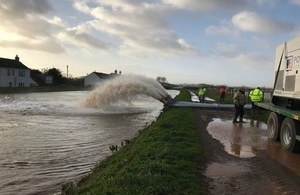Bringing coordinated relief to the people of Syria
Thank you very much, Madam President. May I join the others in welcoming His Excellency to the Council. Kuwait has made an outstanding contribution, if I may say so, as a donor and as a Security Council member. It has been an honour to work with you and your delegation, Minister, and you have always, your delegation has always focussed on the heart of the issue, whether it’s international peace and suffering or today, the relief of human suffering. So thank you very much for everything Kuwait has done for the Security Council.
Madam President, we share the concerns that have been expressed around the table, and I think they follow a common theme. For various reasons, the international community has not served the Syrian people as well as we might since 2012, despite some specific heroic efforts involving OCHA and the UN and volunteers like the White Helmets. And I’d like to, through the Assistant Secretary-General, once again salute the work that OCHA and the other humanitarian agencies do to help the Syrian people.
And now, as others have noted, after seven long and terrible years, the political process may finally have an opportunity to turn the corner. And of course, we support that and we will do what we can to help Mr Pedersen deliver that.
But very sad to relate, other areas on the ground have not made such progress. And this is not due to the international community. This is due to the Syrian authorities and the countries who give them the most support. In particular – I’ll come on to the worsened humanitarian situation in a minute -but I think we need to look at Idlib and Rukhban, the added upcoming pressure of winter, as others have said, the targeting of civilian objects around Idlib and the need for IHL to be upheld. Terrorism is no justification for violating the Geneva Conventions. We say it every time we meet in this chamber but it remains as true today as it did when the Geneva Conventions were first drawn up.
But the situation that’s worst of all, I think, is the one that the Assistant Secretary-General outlined. The situation is getting worse, and people – 4 million people – are at very grave risk. And this is why exceptionally cross-border assistance remains needed and it has been needed since 2014; this is set out clearly in the letter that the Emergency Relief Coordinator sent the Security Council and it’s been set out by others and other correspondents in the last few days. And we should be, no doubt, I think, having heard this briefing, that fewer than four crossings and less than 12 months means that we save fewer of the 4 million lives at stake and it leads to more suffering for the Syrian people.
Now, as others have mentioned the impending resolution, Madam President, let me turn to that as well. The German representative set out in his statement why they have drafted the resolution in the way they have, and we respect that. The penholders are trying to find a way through on this very important issue so that as many of those 4 million lives as possible can be saved and their suffering relieved.
It’s not clear to us, Madam President, what has changed since last year when the cross-border resolution was passed. What has changed to justify such a dramatic reduction in cross-border assistance, as has been proposed by other members of the Council, down to two crossings for only six months? In 2014, the cross-border resolution passed unanimously. It passed unanimously in 2015 and 2016. In 2017, it passed with 12 votes in favour and three abstentions. And in 2018, last year, it passed with 14 votes in favour and two abstentions. So I repeat, it is not at all clear why the situation should be deemed by some to be so drastically different today.
I would make a real appeal – joining others, Madam President – for us to take the penholder text and do the very best we can to protect the Syrian people. This is a humanitarian briefing, some very important humanitarians are around the table today. The most important thing we can do, as Ursula said, is to pass a resolution that brings genuine relief over a serious period of time based on end state, not on end date, and with all the crossings that the UN believes it needs.
OCHA is the part of the international system that UN Member States, all of us, have charged with coordinating humanitarian efforts. We may not always agree with OCHA or the UN on every individual point or every individual issue, but they are discharging their responsibility to the membership and to the Syrian people to get the assistance to reach those communities in direst need. If the UN does not help these communities, there is no evidence, no evidence at all to believe that the Syrian government either wants to or can or will provide that assistance. So I hope we can find a way forward on the resolution so that the Assistant Secretary-General and her teams can do the job we have bestowed upon them to do.
Thank you, Madam President.
